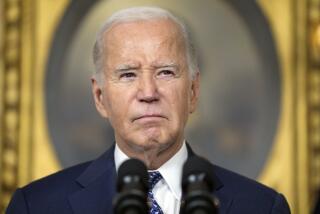Bush Denial on Iraq Arms Aid Challenged : Foreign policy: Papers show State Department knew U.S. exports were used in Baghdad weapon programs, lawmaker says.
- Share via
WASHINGTON — Statements by President Bush that U.S. exports did not assist Iraq’s development of nuclear, chemical and biological weapons before the Persian Gulf War are contradicted by newly declassified documents, a Democratic congressman charged Wednesday.
One of the documents shows that by July, 1990, a month before Iraq invaded Kuwait, the State Department had identified 73 exports approved by the U.S. government that were probably being used in Iraq’s ambitious weapons programs.
The same document--which urged stricter controls on the sale of such goods--confirms that then-Secretary of State James A. Baker III was told that Iraq was obtaining the equipment through U.S. firms.
Rep. Sam Gejdenson (D-Conn.), who released the material, said the records demonstrate that Baker knew that the U.S. government was approving exports that were helping Iraq develop nuclear, chemical and biological weapons and that Bush should have known.
“George Bush has been categorically denying facts that were well-known within his Administration and by his friend, Secretary Baker,” Gejdenson told reporters.
For months, critics have asserted that the Bush Administration permitted the export of sensitive material to Iraq in the hope that relations between the two countries would improve. Ultimately, those critics charge, the Administration inadvertently helped build Iraq’s war machine.
In June, Bush denied that the United States provided any technology that helped Iraq’s nuclear, biological or chemical capabilities. In a July 1 TV appearance, he repeated the denial and called such allegations politically motivated.
A White House spokesman said Wednesday that he stood by the President’s statements. In a response prepared in July after a story in The Times describing similar documents, the National Security Council said the record supported Bush’s denials.
“Reports that U.S. technology significantly enhanced the weapons capability of Iraq are unfounded and simply untrue,” said the report to Brent Scowcroft, the national security adviser.
Arkansas Gov. Bill Clinton’s campaign has largely ignored the Iraq revelations, but in response to Gejdenson’s statements and to assertions Monday by Rep. Henry B. Gonzalez (D-Tex.), Democratic National Committee Chairman Ronald H. Brown on Wednesday accused Bush of concealing the Administration’s prewar military assistance to Iraq.
“It is long past time for George Bush to come clean with the American people and explain why his intelligence agencies, State Department and Justice Department simply looked the other way when confronted with clear evidence that Saddam (Hussein, Iraq’s leader,) was using front companies here in the U.S. to fuel his military machine,” Brown charged.
In response to a question at his press conference, Gejdenson denied that his release of the documents was political. He said his House Foreign Affairs subcommittee has been trying for two years to persuade the State Department and other agencies to declassify material related to U.S.-Iraq policy.
The documents show that concerns were mounting in the State Department in July, 1990.
A July 19, 1990, memo to Baker from Iraq and Mideast experts in the State Department warned that Iraq was developing chemical and biological weapons and ballistic missiles and that it was working on nuclear weapons. The memo recommended that Baker support stricter controls on exports to Iraq.
“Iraq has been attempting to obtain items to support these proliferation activities from U.S. exporters, in some cases successfully,” said the memo, which was initialed by Baker to acknowledge that he had read it.
An initial review uncovered 73 export licenses for goods sent to Iraqi facilities that were “probably proliferation related,” the memo said. Among them were 17 licenses for bacteria with uses in biological weapons and sophisticated computers with uses in chemical and missile programs.
On July 25, 1990, nine days before Iraq invaded Kuwait, Baker asked then-Commerce Secretary Robert A. Mosbacher for new controls over exports. “Iraq’s extraordinarily aggressive weapons proliferation efforts make this situation urgent,” wrote Baker, who is now Bush’s chief of staff.
Gejdenson contended that Baker’s request was an attempt to “cover his trail” as the Administration saw its efforts to influence Hussein failing. But a State Department official said Wednesday that the department acted to restrict exports to Iraq as soon as it uncovered hard evidence of abuses. Previously disclosed documents, however, indicate that U.S. intelligence agencies had warned of Iraq’s weapons programs as early as 1985.
More to Read
Sign up for Essential California
The most important California stories and recommendations in your inbox every morning.
You may occasionally receive promotional content from the Los Angeles Times.












